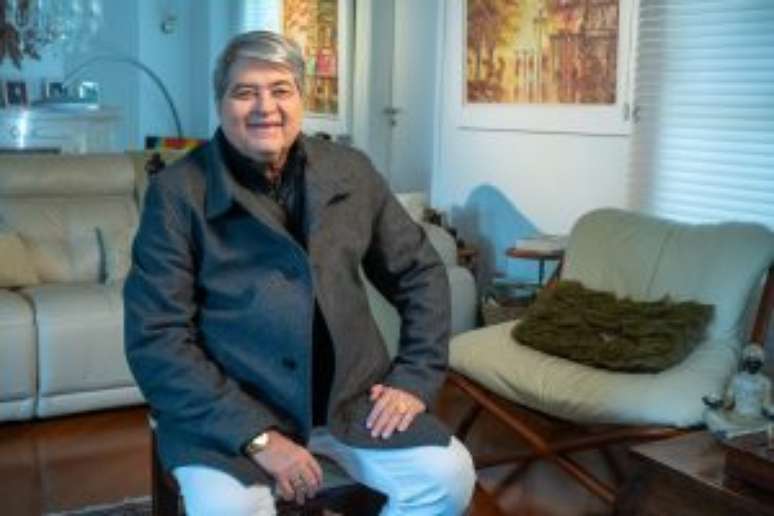Both China and the United States have major interests in the island, which holds more than half of the world’s microchip production. Saturday’s elections could define the shape of the autonomous territory’s relations with Beijing.
On Saturday, January 13, Taiwanese voters will go to the polls to elect a new president and a new parliament, the legislative yuan, as Taiwan’s parliament is known.
Both China and the United States are following the Taiwanese elections closely. The two countries maintain vital strategic interests in the self-governing island.
This could have major consequences for the nature of the island’s relations with China and, as a result, increase tensions in the region, affecting the entire global economy.
But why are Taiwan’s elections so important to the rest of the world?
Most electronic equipment used every day around the world, from cell phones to laptops, watches and video game consoles, contain computer chips made in Taiwan.
To give an example, a single Taiwanese company – the Taiwan Semiconductor Manufacturing Company (TSMC) – holds more than half of the world market. It’s called the “foundry” industry, and it makes microchips to order for businesses or the military.
It is a gigantic sector – in 2021 it was valued at almost $100 billion (about R$490 billion) – and is affected by the island’s tense relations with China, which sees Taiwan as part of its territory.
Although the island declares itself sovereign, the United Nations does not recognize Taiwan as an independent country. Only 12 of the 196 UN countries recognize Taiwan as a sovereign country. There are 12 countries of little international importance, most of which are archipelagos or islands in the Pacific and Central American nations.
Washington has long sought, through export controls and other measures, to limit China’s access to chip technology. The intention is to prevent Beijing from catching up with the progress made by the United States and its allies, including Taiwan, in the microchip sector.
China’s possible takeover of Taiwan could give Beijing a greater degree of control over one of the world’s most important industries.
Read the report: The important role of the ‘silicon shield’ protecting Taiwan from China
The current president of Taiwan, Tsai Ing-wen, of the Democratic Progressive Party (PPD, considered separatist from China), leaves power after two consecutive terms, following constitutional limitations. Three candidates are vying to succeed him.
A coalition led by the PPD hopes to maintain a majority among the 113-seat Legislative Yuan, which has the power to draft laws, approve budgets, declare war and resolve other state problems.
What do the Taiwanese want?
Despite tensions between China and Taiwan, opinion polls indicate that the issue that worries Taiwanese most is the country’s economy.
A 2023 poll, funded by the National Science and Technology Council (which is an official body), concluded that 34.2% of participants considered the economy the most pressing concern facing the next president. China-Taiwan relations ranked second, with 18.1%.
Many Taiwanese are dissatisfied with low wages (particularly among young people and workers), the high cost of living, and rising housing costs.
President Tsai Ing-wen promised “a better country for the younger generation” during her 2015 campaign. But many voters believe she has failed to deliver on her promise.
The results of the 2022 local elections were unfavorable for the PPD, leading Tsai to resign as party leader. Many blame the government’s poor performance in trying to improve people’s daily lives as the cause of the party’s electoral failure that year.
Taiwanese citizens who have reached the age of 20 and have lived continuously on the island for at least six months have the automatic right to vote. In total there are approximately 19 million voters; the turnout rate in the last elections was 75%.
What does China want? And the United States?
The island of Taiwan is located approximately 161 km off the southeastern coast of China. It has been self-governing since the Kuomintang (KMT, Nationalist Party) government lost the civil war against the Communist Party and withdrew from the mainland to the island in 1949.
Decades later, Taiwan became a democracy, with its own Constitution. Most people consider the island different from mainland China.
But the Chinese Communist Party views its eventual control over Taiwan as a matter of national security.
Chinese President Xi Jinping has repeatedly declared the need for “reunification” and has not ruled out the possibility of using force to achieve this goal.
The United States has repeatedly stated that it is ready to prevent possible Chinese military actions.
Taiwan is part of a group of countries geographically close to China – which includes allies such as Japan, the Philippines and South Korea – of great importance for American foreign policy.
If China retakes Taiwan, Western experts suggest Beijing may have more freedom to project its power in the Western Pacific region. It could even, they say, threaten American military bases in more distant places, such as Guam and Hawaii.
But Beijing insists its intentions are purely peaceful.
Currently, opinion polls show that CPP candidate Lai Ching-te is slightly ahead of the KMT’s Hou Yu-ih. The third candidate, Ko Wen-je, of the PPT, is further behind in terms of voting intentions.
On the other hand, Chinese pressure has increased over the past year. Beijing has often sent military ships and planes to Taiwan. They cross the midline of the strait that separates the mainland from the island almost daily.
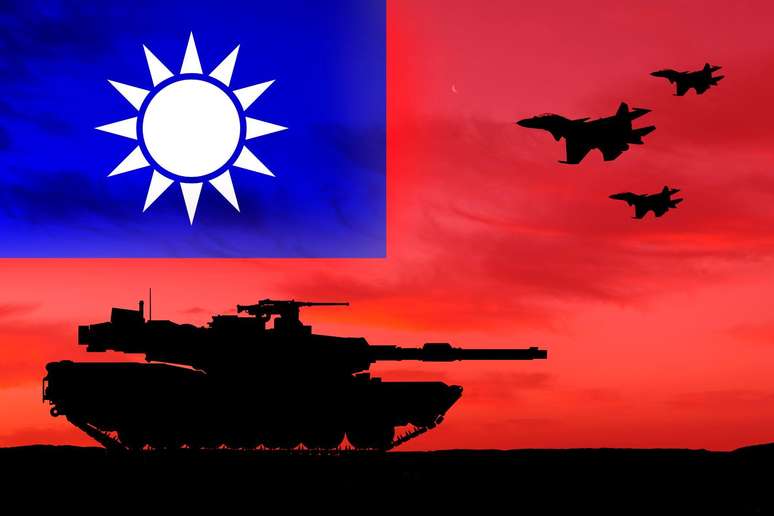
Could Taiwan defend itself?
Much of China’s military power is focused on other tasks. Even so, in terms of the active contingent, for example, the imbalance between the two sides is enormous.
In a possible military confrontation, China’s armed forces would be immensely superior to those of Taiwan. But this does not mean that the island is not well armed, nor that it is alone.
Even after 1979, when the United States began to diplomatically recognize China instead of Taiwan, the Americans continued to sell weapons to the island, based on their Taiwan Relations Act.
In July 2023, the United States released an arms aid package for Taiwan, which reached a value of $345 million (about R$1.7 billion). And just before the end of the year, the US State Department approved the sale of $300 million (about R$1.47 billion) worth of military equipment to help maintain Taiwan’s tactical information systems.
In May 2022, US President Joe Biden was asked whether the United States would defend Taiwan militarily. His answer was “yes”. The White House later declared that Washington had not changed its “one China policy.”
But China’s defense spending is higher than that of any other country except the United States. And Beijing could draw on a wide range of resources, including naval power, missile technology, aeronautics and cyberattacks.
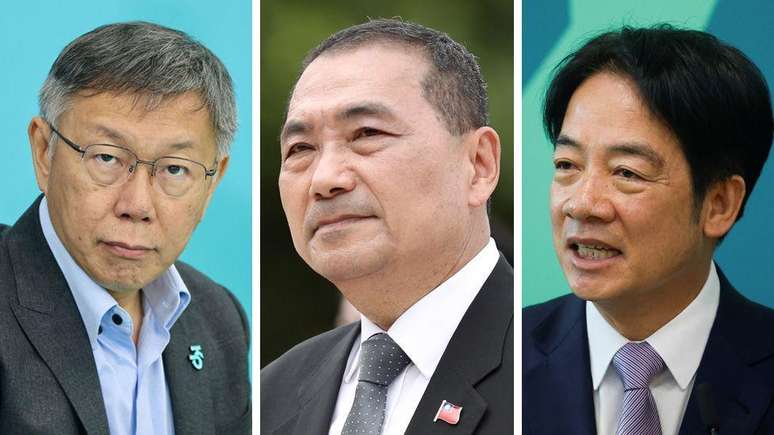
Who are the presidential candidates right now?
Lai Ching-te, Democratic Progressive Party (PPD)
Lai is a doctor and has held nearly all of Taiwan’s highest political offices. He has been vice president of the island since 2020.
Also known as William Lai, the candidate is the leader of the Pan-Green coalition and advocates a strong, global Taiwanese identity. He opposes reunification with China and prefers closer ties with the United States over Beijing.
China considers Lai an intransigent “divisionist”, “much worse than Tsai”.
But as election day approaches, he repeats the current president’s careful motto: “Taiwan is already independent and needs no further declaration.”
Hou You-yi, Kuomintang (KMT)
Hou is a former police officer. In 2022 he easily won re-election as mayor of New Taipei (a suburb of the Taiwanese capital). He is considered moderate and has a reputation for being efficient.
Hou releases the Pan-Blue coalition, which advocates stronger ties with China – or even its possible unification.
He recently declared that his priority now is to maintain the status quo, that is, not to declare independence or seek unification with China.
Ko Wen-je – Taiwan People’s Party (PPT)
Ko was a surgeon until 2014, when he ran for mayor of the Taiwanese capital, Taipei, as an independent candidate.
He formed the Taiwan People’s Party in 2019, as a third option for voters dissatisfied with the PPD and KMT. The PPT’s position on Taiwan-China relations is ambiguous.
The TPP and KMT attempted to form an alliance to participate in the elections, but negotiations collapsed in November.
Source: Terra
Rose James is a Gossipify movie and series reviewer known for her in-depth analysis and unique perspective on the latest releases. With a background in film studies, she provides engaging and informative reviews, and keeps readers up to date with industry trends and emerging talents.

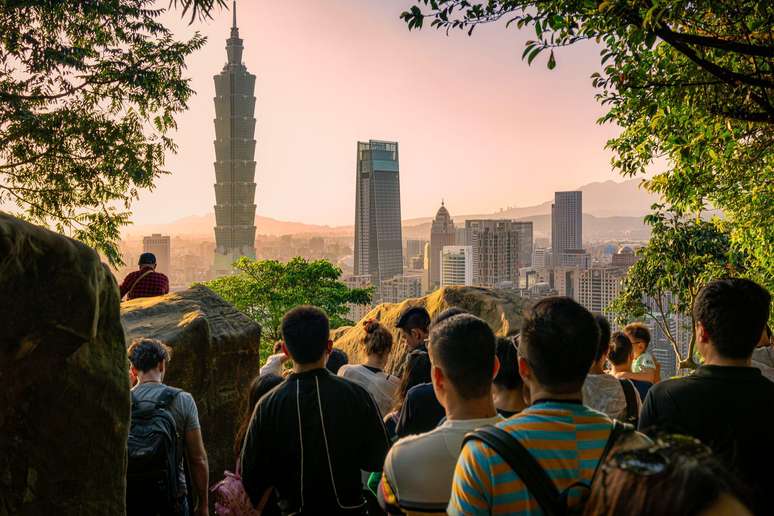
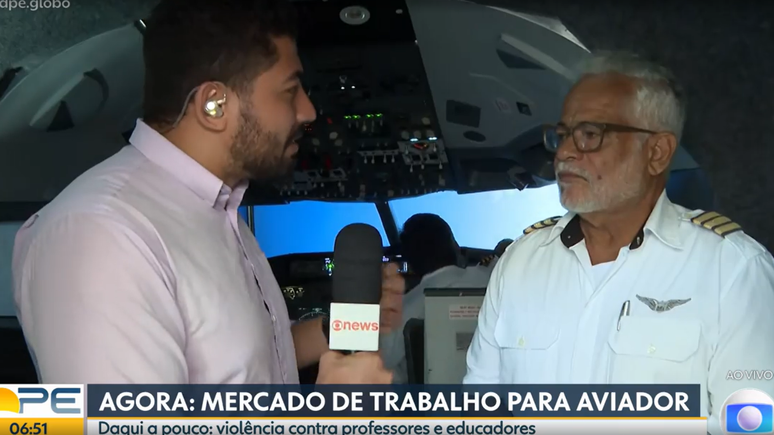
![A Better Life Preview: What’s in store for Friday, October 24, 2025 Episode 449 [SPOILERS] A Better Life Preview: What’s in store for Friday, October 24, 2025 Episode 449 [SPOILERS]](https://fr.web.img6.acsta.net/img/16/27/1627e795b389773da60b2ef0a5dfdfd0.jpg)

